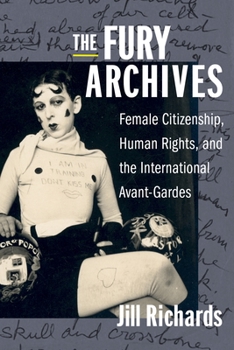The Fury Archives: Female Citizenship, Human Rights, and the International Avant-Gardes
(Part of the Modernist Latitudes Series)
Select Format
Select Condition 
Book Overview
In the late nineteenth and early twentieth centuries, radical women's movements and the avant-gardes were often in contact with one another, brought together through the socialist internationals. Jill Richards argues that these movements were not just socially linked but also deeply interconnected. Each offered the other an experimental language that could move beyond the nation-state's rights of man and citizen, suggesting an alternative conceptual vocabulary for women's rights.
Rather than focus on the demand for the vote, The Fury Archives turns to the daily practices and social worlds of feminist action. It offers an alternative history of women's rights, practiced by female arsonists, suffragette rioters, industrial saboteurs, self-named terrorists, lesbian criminals, and queer resistance cells. Richards also examines the criminal proceedings that emerged in the wake of women's actions, tracing the way that citizen and human emerged as linked categories for women on the fringes of an international campaign for suffrage. Recovering a transatlantic print archive, Richards brings together a wide range of activists and artists, including Lumina Sophie, Ina C saire, Rosa Luxemburg, Rebecca West, Angelina Weld Grimk , Elizabeth Gurley Flynn, Hannah H ch, Claude Cahun, Paulette Nardal, and Leonora Carrington. An expansive and methodologically innovative book, The Fury Archives argues that the relationship of women's rights movements and the avant-gardes offers a radical alternative to liberal discourses of human rights in formation at the same historical moment.Format:Paperback
Language:English
ISBN:023119711X
ISBN13:9780231197113
Release Date:August 2020
Publisher:Columbia University Press
Length:344 Pages
Weight:1.00 lbs.
Dimensions:0.8" x 6.0" x 8.9"
Customer Reviews
0 rating





